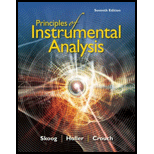
Principles of Instrumental Analysis
7th Edition
ISBN: 9781305577213
Author: Douglas A. Skoog, F. James Holler, Stanley R. Crouch
Publisher: Cengage Learning
expand_more
expand_more
format_list_bulleted
Question
Chapter 26, Problem 26.12QAP
Interpretation Introduction
Interpretation:
The variables in the chromatography leading to zone separation are to be stated.
Concept introduction:
Chromatography involves dissolving a sample in mobile phase. This phase is then made to pass through a stationary phase. Chromatogram refers to the representation of the separation that occurs chemically.
Expert Solution & Answer
Trending nowThis is a popular solution!

Students have asked these similar questions
Basic strength of organic bases.
Nucleophilic Aromatic Substitution: What is the product of the reaction? What is the name of the intermediate complex? *See image
Predict the final product. If 2 products are made, list which should be “major” and “minor” *see attached
Chapter 26 Solutions
Principles of Instrumental Analysis
Ch. 26 - Prob. 26.1QAPCh. 26 - Prob. 26.2QAPCh. 26 - Prob. 26.3QAPCh. 26 - Prob. 26.4QAPCh. 26 - Prob. 26.5QAPCh. 26 - Prob. 26.6QAPCh. 26 - Prob. 26.7QAPCh. 26 - Prob. 26.8QAPCh. 26 - Prob. 26.9QAPCh. 26 - Prob. 26.10QAP
Ch. 26 - Prob. 26.11QAPCh. 26 - Prob. 26.12QAPCh. 26 - Prob. 26.13QAPCh. 26 - Prob. 26.14QAPCh. 26 - Prob. 26.15QAPCh. 26 - Prob. 26.16QAPCh. 26 - From the data in Problem 26-14, calculate for...Ch. 26 - Prob. 26.18QAPCh. 26 - Prob. 26.19QAPCh. 26 - Prob. 26.20QAPCh. 26 - Prob. 26.21QAPCh. 26 - Prob. 26.22QAPCh. 26 - Prob. 26.23QAP
Knowledge Booster
Similar questions
- Nucleophilic Aromatic Substitution: What is the product of the reaction? *see imagearrow_forwardShow the correct sequence to connect the reagent to product. * see imagearrow_forwardThe answer here says that F and K have a singlet and a doublet. The singlet and doublet are referring to the H's 1 carbon away from the carbon attached to the OH. Why don't the H's two carbons away, the ones on the cyclohexane ring, cause more peaks on the signal?arrow_forward
- Draw the Birch Reduction for this aromatic compound and include electron withdrawing groups and electron donating groups. *See attachedarrow_forwardShow the correct sequence to connect the reagent to product. * see imagearrow_forwardBlocking Group are use to put 2 large sterically repulsive group ortho. Show the correct sequence toconnect the reagent to product with the highest yield possible. * see imagearrow_forward
- Elimination-Addition: What molecule was determined to be an intermediate based on a “trapping experiment”? *please solve and see imagearrow_forwardShow the correct sequence to connect the reagent to product. * see imagearrow_forwardPredict the final product. If 2 products are made, list which should be “major” and “minor”. **see attachedarrow_forward
arrow_back_ios
SEE MORE QUESTIONS
arrow_forward_ios
Recommended textbooks for you
 Principles of Instrumental AnalysisChemistryISBN:9781305577213Author:Douglas A. Skoog, F. James Holler, Stanley R. CrouchPublisher:Cengage Learning
Principles of Instrumental AnalysisChemistryISBN:9781305577213Author:Douglas A. Skoog, F. James Holler, Stanley R. CrouchPublisher:Cengage Learning Macroscale and Microscale Organic ExperimentsChemistryISBN:9781305577190Author:Kenneth L. Williamson, Katherine M. MastersPublisher:Brooks Cole
Macroscale and Microscale Organic ExperimentsChemistryISBN:9781305577190Author:Kenneth L. Williamson, Katherine M. MastersPublisher:Brooks Cole EBK A SMALL SCALE APPROACH TO ORGANIC LChemistryISBN:9781305446021Author:LampmanPublisher:CENGAGE LEARNING - CONSIGNMENT
EBK A SMALL SCALE APPROACH TO ORGANIC LChemistryISBN:9781305446021Author:LampmanPublisher:CENGAGE LEARNING - CONSIGNMENT

Principles of Instrumental Analysis
Chemistry
ISBN:9781305577213
Author:Douglas A. Skoog, F. James Holler, Stanley R. Crouch
Publisher:Cengage Learning


Macroscale and Microscale Organic Experiments
Chemistry
ISBN:9781305577190
Author:Kenneth L. Williamson, Katherine M. Masters
Publisher:Brooks Cole

EBK A SMALL SCALE APPROACH TO ORGANIC L
Chemistry
ISBN:9781305446021
Author:Lampman
Publisher:CENGAGE LEARNING - CONSIGNMENT